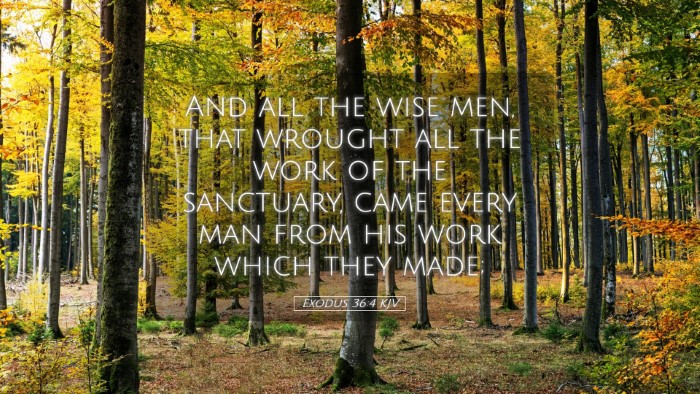Commentary on Exodus 36:4
Exodus 36:4 states:
"And all the wise men that wrought all the work of the sanctuary came every man from his work which they made."
This verse signifies a pivotal moment in the construction of the Tabernacle, where skilled artisans, motivated by divine inspiration, unite their efforts in a common purpose. The ensuing commentary draws from esteemed public domain sources to elucidate the spiritual and practical implications of this passage.
Contextual Background
In the preceding chapters of Exodus, God articulates the detailed plans for the Tabernacle, a sacred dwelling for the presence of God among His people. The call for skilled laborers reflects God's provision of talent and the communal effort required in fulfilling His divine instructions. This collective endeavor is not merely a logistic task; it serves as a profound spiritual metaphor for the unity and cooperation expected within the community of believers.
Insights from Matthew Henry
Matthew Henry, in his commentary, emphasizes the importance of craftsmanship as a reflection of divine order:
- Divine Inspiration: Henry notes that the wise men possessed wisdom from the Lord, highlighting the necessity of divine guidance in all undertakings, particularly in sacred matters.
- Unity in Service: The artisans “came every man from his work,” suggesting a relinquishment of personal projects in favor of communal worship and service. This signifies an essential aspect of worship: prioritizing God’s work above individual ambitions.
- Wisdom and Skill: He highlights that God not only calls individuals to work but equips them with the required gifts to fulfill their roles effectively. The artisans’ dedication showcases the beauty that arises from skilled labor in service to God.
Insights from Albert Barnes
Albert Barnes provides further clarity on the operations of the sanctuary:
- Collaborative Effort: Barnes points out that the artisans' collaborative work exemplifies the concept of teamwork in the body of Christ. No single person was responsible for the Tabernacle; it required contributions from many, signifying that each member of the community has a role to play in God’s kingdom.
- Attention to Detail: The meticulous nature of the work serves as a reminder that God values both the work and the heart with which it is done. Attention to detail reflects the greatness of God, who is a God of order and precision.
- Response to Divine Call: Barnes emphasizes that the wise men responded to God's invitation to create, illustrating a model of obedience and enthusiasm for spiritual work. Their example teaches modern believers the importance of heeding God’s call in various forms of service.
Insights from Adam Clarke
Adam Clarke’s analysis delves into the character of those who worked on the Tabernacle:
- Character of Artisans: Clarke notes that the artisans' wisdom was evident through their actions, portraying a lived wisdom that transcends mere knowledge. Their communal shift in focus to the Tabernacle's construction indicates a profound spiritual commitment.
- Preparation for Worship: The act of coming together highlights the community’s readiness for worship. Clarke suggests that such preparedness is essential for any successful ministry, as it fosters a spirit of unity and purpose within a congregation.
- Importance of Community: His commentary reflects on the necessity of a supportive community in undertaking spiritual tasks, illustrating how God’s work thrives in a collaborative environment enriched by diverse talents and shared commitment.
Theological Implications
The theologians collectively convey significant lessons emanating from Exodus 36:4:
- God's Calling and Empowerment: Each believer is considered a craftsman in God’s service, endowed with specific gifts intended for the edification of the church. This verse reiterates the belief in the divine calling of every believer to contribute to the common good.
- Worship as a Collective Experience: The construction of the Tabernacle represents the collaborative aspect of worship and community life. It reminds believers that worship transcends individual spirituality—it thrives within the shared experiences and contributions of the faith community.
- Commitment to Excellence: The text calls for an attitude of excellence in every facet of service to God. The artisans' dedication serves as an archetype for believers today to pursue their spiritual callings with fervor and meticulousness.
- Spiritual Gifts in Action: This verse exemplifies how spiritual gifts are utilized in tangible and practical ways within the life of the church. The artisans' collective effort underscores the vital role of each member’s gifts in the flourishing of the community.
Application for Modern Believers
Exodus 36:4 invites pastors, students, theologians, and scholars to reflect on its numerous practical applications:
- Encouraging Collaboration: Churches and ministries are encouraged to cultivate environments where individual gifts are recognized and valued, promoting collaborative efforts in worship, service, and outreach.
- Fostering Commitment: Believers should be challenged to prioritize their spiritual responsibilities, much like the artisans did, redirecting energies from personal ambitions toward communal goals that glorify God.
- Highlighting Spiritual Gifts: Pastors can utilize this text to teach congregants about the importance of recognizing and utilizing their spiritual gifts, fostering a participatory church culture.
- Creating a Culture of Worship: This verse can inspire church leaders to create spaces where worship is both a personal and communal activity, reinforcing the significance of coming together in faith and purpose.
Conclusion
Exodus 36:4 encapsulates the essence of communal service and the sacredness of work prepared for God. The insights from Matthew Henry, Albert Barnes, and Adam Clarke collectively form a rich tapestry of understanding that encourages ongoing reflection on spiritual gifting, community involvement, and the dedication required to fulfill God's calling. For modern-day believers, this passage serves as a reminder of the significance of each person's contribution within the body of Christ and the beauty that arises when individuals unite in their pursuit to glorify God through their gifts.


